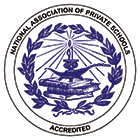Examining Vision
By James Leonard
August 18, 2015I have had vision issues all my life and know regular visits to the eye doctor are essential. During a recent visit to my optometrist I asked him to review my article “Vision - Beyond 20/20”. He found it very interesting and shared my concern for children’s vision. I asked if he would share some professional advice for positing on our website. He gladly agreed and sent me following thoughts to share.
“Did you know eighty percent of what a school-age child learns is through vision?
Vision and learning go hand in hand, but reading the small row of letters on a chart at the eye doctor's office or during a school screening does not ensure high academic performance. A person may see 20/20, but that does not tell us how much effort was required for them to see it, how long they can keep it clear and if a person can assign meaning to what he or she sees. Routine eye examinations can be an integral part of a student's success in school because it allows an eye doctor to detect other problems with the visual system that can occur even if a person has 20/20 or "perfect" vision in each eye. Other problems that can occur with the visual system are outlined below.
If a person's eyes are not aligned properly or do not work together as a team it can lead to stress on the visual system, and this can be a hurdle or an obstacle to learning. Some people have a type of eye teaming problem called a strabismus or eye turn, where one eye can turn in, out, up or down constantly or intermittently. A more common eye teaming problem is when a patient's eyes have a tendency to point outward (exophoria) or inward (esophoria). In some cases a patient's eye may even point up or down. Some patient's with eye teaming problems may be helped with prism in their glasses. A prism is a lens that moves the image to where the eyes like to be at rest, this decreases the workload on the visual system. Vision therapy may be helpful depending on the type of eye teaming problem. Vision therapy is a method used to train a person's eye teaming and focusing systems to help someone compensate for the eye deficiencies they may have. Some patient's with a strabismus may benefit from surgery to correct their eye alignment.
Reduced focusing ability is another problem that can be detected by an eye doctor. This eye problem can make reading difficult because reading material may only be clear intermittently. Some patient's focusing systems can fatigue easily or not work as well as expected for their age. These patients can often benefit from glasses that help relax their focusing system and decrease the amount of work their eyes have to do throughout the day. Some patient's with focusing problems may benefit from vision therapy.
Lots of head movement when following a moving target or when reading can be an indicator of an eye-tracking disorder. Eye tracking problems often interfere with reading performance. Vision therapy can be used to improve eye tracking disorders.
If someone has difficulty interpreting what they see they may have a visual perceptual problem. These patients have difficulty interpreting what they see. This problem can be improved with visual perceptual therapy.
All of these problems mentioned above can be detected through routine eye examinations if the appropriate diagnostic tests are performed. This is why comprehensive eye care is important throughout an entire lifetime-for infants, children, teens and adults.”
As the “school” year begins and curriculum and supplies are ordered don’t forget to check off a most important “tool” for success a vision test. As part of our academic diagnostics, BCE Academy offers some instructions for basic developmental vision screening that can be done at home. We also encourage annual professional examinations. When choosing an Optometrist or making an appointment be sure to ask if the doctor will screen for all aspects of vision as my doctor has indicated above.
Good vision essential to academic success. Be sure you students have all that is necessary for success!
Jim

